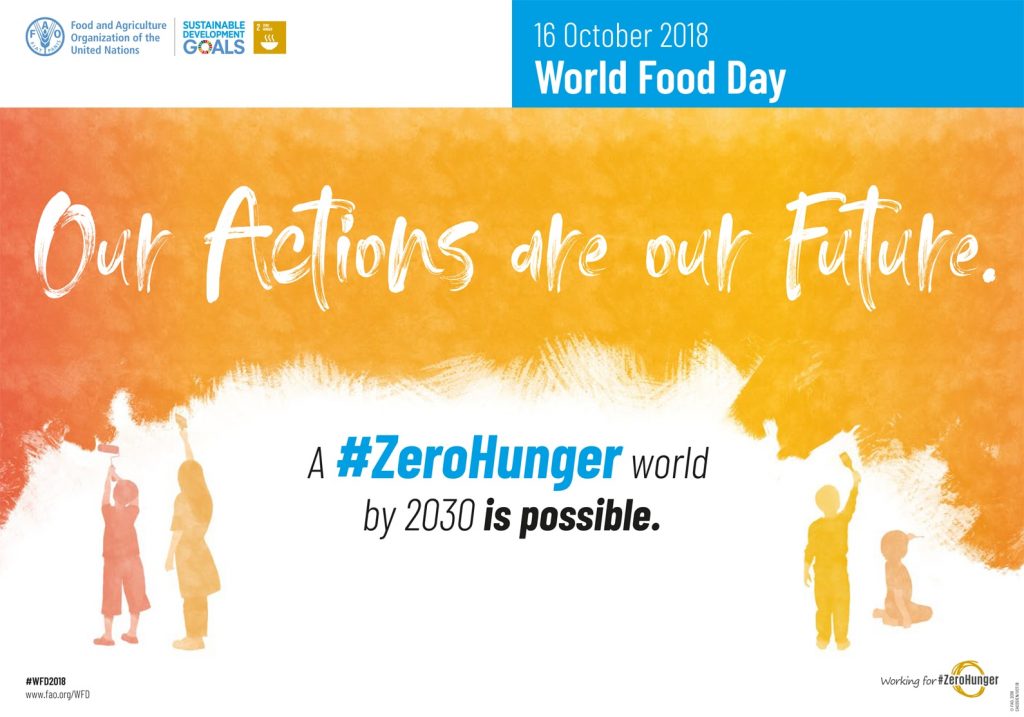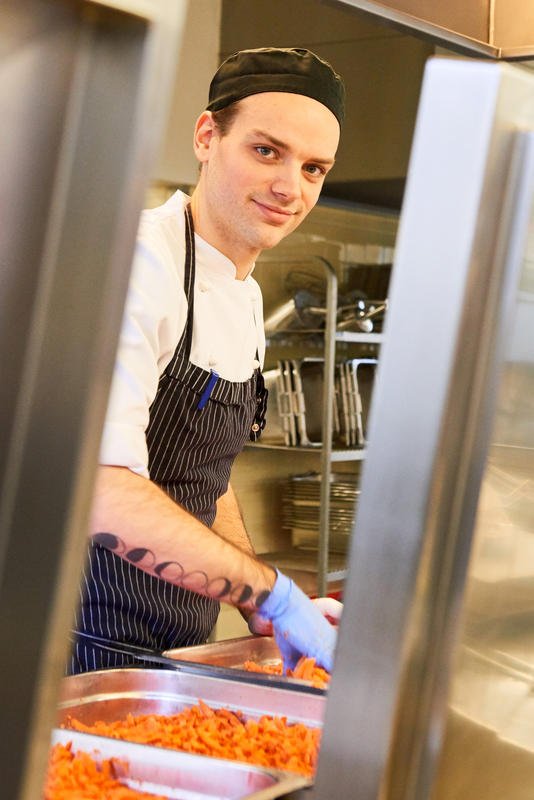Today, October 16, is World Food Day. At Health Populi and THINK-Health, we celebrate the birthday of the Food and Agriculture Organization (FAO), allied with the United Nations. FAO was founded to address malnutrition and bolster a sustainable, healthy food supply for people.

World Food Day 2018 has four objectives:
- Don’t waste food
- Produce more food with fewer resources
- Advocate for #ZeroHunger by 2030, and,
- Adopt a healthier, more sustainable diet.
All four of these pillars play a role in health, but I’ll focus today on the fourth: the role of food as a major social determinant of health.
Hunger is the ultimate health risk. An unhealthy diet contributes to nearly 700,000 U.S. deaths each year, attributable to heart disease, cancer, and Type 2 diabetes.
Six in ten patients who are admitted to U.S. hospitals are malnourished, according to the Academy of Nutrition and Dietetics.
U.S. hospitals can learn from a German hospital that recently hired a star chef who had been serving up ten-course meals for Berlin’s “gourmands.”
 At Berlin’s Havelhoehe Hospital, Chef Patrick Wodni is re-imagining what goes onto an inpatient’s food tray looking beyond broth, boiled potatoes, and Jello.
At Berlin’s Havelhoehe Hospital, Chef Patrick Wodni is re-imagining what goes onto an inpatient’s food tray looking beyond broth, boiled potatoes, and Jello.
According to a profile on Wodni in the New York Times international edition this week, Wodni, tiring of cooking for the city’s “upper echelons,” saw an opportunity to cooking healthy food for sick people…and he took it.
It’s interesting to note that Havelhoehe is part of a network of “anthroposophic hospitals” that are embodied in the teachings of Rudolf Steiner, who you may know through his schools or philosophic writings.
This mindset translates into a more integrative medicine approach for patients….with food as a key component to whole-health therapeutics.
Among Wodni’s innovations in reinventing hospital food, he’s figured out how to incorporate local ingredients like organic vegetables, grass-fed beef and sustainable seafood into the inpatient menus — while keeping costs low, the NY Times noted.
Hospitals have an ally in some innovative food manufacturers who have made a strategic decision to lead at the intersection of medicine and food. Danone (known as Dannon in the U.S.), has honed its portfolio of business to focus on health and well-being, which I’ve discussed here in Health Populi.
Danone works on medical nutrition designed around patients in various stages of diseases including allergy, metabolic disorders, oncology and stroke. The company has quantified cost savings based on fewer complications in these patients, ultimately lowering the risks of mortality. One example of direct cost-savings to the healthcare system is lowering a patient’s length of stay in hospital; in the case of using oral nutritional supplements like the company’s Fortimel, Danone calculated a two-day savings of inpatient costs.
For more on World Food Day, see this video…
Health Populi’s Hot Points: Closer to home, I sit on the board of The Clinic of Phoenixville in suburban Philadelphia. Our health center provides free services to people who are un- and under-insured, regardless of ability to pay. We are funded through Foundations, individual donations, and patient contributions when they can afford to pay “something,” whatever they choose. One of our physicians, Dr. Ana Negrón, participates in a community garden project where she grows produce and shows patients how to cook fresh vegetables, read food labels, and adopt healthier lifestyles. She has helps dozens of Clinic patients reverse Type 2 diabetes or, for people diagnosed with pre-diabetes numbers, prevent the condition’s onset. Here, in the world of Dr. Negrón, food-and-gardens are medicine, as this article in the Philadelphia Inquirer described. Here’s Dr. Negrón in the garden.
 In a kind of It’s-A-Small-World coincidence, the CSA Farm (community-supported agriculture) to which my family belongs in Kimberton, Pennsylvania, is literally rooted in the teachings of Rudolf Steiner — like the Berlin hospital’s model. Our farmers use homeopathic approaches to farming, and our produce is some of the most beautiful and nutritious grown in the region. We feel so lucky to be part of this community as an off-line, face-to-face social network. This is one of my family’s choices to engage in DIY healthcare to bolster our well-being and minimize our health risks given what we know-we know from family history, lab tests, and lifestyles.
In a kind of It’s-A-Small-World coincidence, the CSA Farm (community-supported agriculture) to which my family belongs in Kimberton, Pennsylvania, is literally rooted in the teachings of Rudolf Steiner — like the Berlin hospital’s model. Our farmers use homeopathic approaches to farming, and our produce is some of the most beautiful and nutritious grown in the region. We feel so lucky to be part of this community as an off-line, face-to-face social network. This is one of my family’s choices to engage in DIY healthcare to bolster our well-being and minimize our health risks given what we know-we know from family history, lab tests, and lifestyles.
We are but one family that’s part of a global trend of consumers keen to adopt products and services that boost health and well-being via food, Mintel has found. A key issue folks are embracing, around the world, is gut health — which is being negatively impacted by financial/economic, political, and social stressors. “People are looking for ways to help themselves,” Mintel observed in their latest research into microbiome health.
More consumers are also embracing technologies to improve health and well-being for food and weight tracking, Mintel found. Increasingly, our individual tracking is being married to social networks where we can share our data with others keen to live healthy lives. Mintel noted a “challenge accepted” trend among people measuring themselves vis-a-vis others, but also inspiring other people in their community.
On this World Food Day, be mindful of the opportunity that today and every day presents to make healthy food choices — and to pay attention to and benefit your own community’s food and nutrition profile.





 Interviewed live on BNN Bloomberg (Canada) on the market for GLP-1 drugs for weight loss and their impact on both the health care system and consumer goods and services -- notably, food, nutrition, retail health, gyms, and other sectors.
Interviewed live on BNN Bloomberg (Canada) on the market for GLP-1 drugs for weight loss and their impact on both the health care system and consumer goods and services -- notably, food, nutrition, retail health, gyms, and other sectors. Thank you, Feedspot, for
Thank you, Feedspot, for  As you may know, I have been splitting work- and living-time between the U.S. and the E.U., most recently living in and working from Brussels. In the month of September 2024, I'll be splitting time between London and other parts of the U.K., and Italy where I'll be working with clients on consumer health, self-care and home care focused on food-as-medicine, digital health, business and scenario planning for the future...
As you may know, I have been splitting work- and living-time between the U.S. and the E.U., most recently living in and working from Brussels. In the month of September 2024, I'll be splitting time between London and other parts of the U.K., and Italy where I'll be working with clients on consumer health, self-care and home care focused on food-as-medicine, digital health, business and scenario planning for the future...